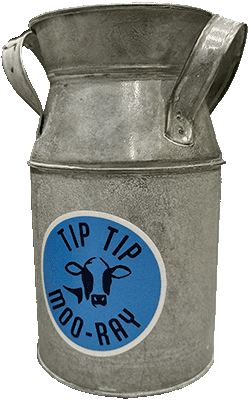Farm-to-consumer raw milk and raw milk product sales could soon become legal in Michigan if three bills pass through state legislature this session. Currently, raw milk is only available through herd share agreements in Michigan.
HB 5217, in a comprehensive package with HB 5218 and HB 5219, propose creating a regulatory structure for on-farm sales of raw milk. The bills include labeling, storage temperature, testing requirements, and more.
View current raw milk sources in Michigan
View all raw milk laws in the USA
Find links and excerpts of the proposed laws below.
HB 5217
Michigan Legislature HB5217: Food: milk; sale of raw milk products; allow. Amends secs. 30 & 68 of 2001 PA 266 (MCL 288.500 & 288.538). TIE BAR WITH: HB 5218’25, HB 5219’25
(9) A direct farm-to-consumer producer is exempt from the licensing provisions of this act if the direct farm-to-consumer producer complies with the requirements under section 4102a of the food law of 2000, MCL 289.4102a. As used in subsection, “direct farm-to-consumer producer” means that term as defined in section 1107 of the food law of 2000, MCL 289.1107.
—
(5) Unpasteurized milk and unpasteurized milk products may be offered for sale and sold to a final consumer by a direct farm-to-consumer producer or a designated agent that complies with section 4102a of the food law of 2000, MCL 289.4102a, if the unpasteurized milk and unpasteurized milk product comply with section 70a of the manufacturing milk law of 2001, MCL 288.630a. As used in this subsection, “designated agent” and “direct farm-to-consumer producer” mean those terms as defined in section 1107 of the food law of 2000, MCL 289.1107.
HB 5218 – rules
Michigan Legislature HB5218: Food: milk; sale of raw milk and raw milk products under the manufacturing milk law of 2001; allow. Amends secs. 111 & 136 of 2001 PA 267 (MCL 288.671 & 288.696) & adds sec. 70a. TIE BAR WITH: HB 5217’25, HB 5219’25
Raw milk and raw dairy products must not be sold at a retail food establishment.
(2) Raw milk and raw dairy products must be packaged in clean, food-grade containers that are suitable for dairy storage. Each container must be have a label that contains all of the following information:
(a) The date the raw milk was bottled or the date the raw dairy product was packaged, as appliable. The label may include an expiration date.
(b) The name and address of the direct farm-to-consumer producer.
(c) The name or type of the product.
(d) The volume or weight of the raw milk or raw dairy product.
(e) The following statement in at least 11-point font: “This product is made with raw (unpasteurized) milk and may contain harmful bacteria. Not pasteurized. Not inspected by the Michigan Department of Agriculture and Rural Development. Consume at your own risk.”.
(3) A direct farm-to-consumer producer may include additional information on the label described under subsection (3), such as the recommend refrigeration temperature or consumption guidelines.
(4) Raw milk and raw dairy products manufactured or sold in this state must comply with the following standards, subject to the requirements under section 138, as applicable:
Storage temperature and testing. These requirements are listed three times under: for human consumption, for products that are not frozen, and products that are frozen.
Temperature: Cooled to and maintained at a temperature of 45?F (7?C) or less within 2 hours after milking. Raw milk must be maintained at a temperature of 45?F (7?C) or less until purchase by a final consumer.
Bacterial limits: Not to exceed 15,000 per ml.
Somatic cell count: Not to exceed 600,000 per ml.
Coliform count: Not to exceed 10 per ml. Infectious disease No positive results for brucellosis or tuberculosis. Animals must be tested at least once every 12 months.
HB 5219 – relevant definitions
Michigan Legislature HB5219: Food: milk; sale of raw milk and raw milk products under the food law; allow. Amends secs. 1107, 1109 & 6140 of 2000 PA 92 (MCL 289.1107 et seq.) & adds secs. 4102a & 4102b. TIE BAR WITH: HB 5217’25, HB 5218’25
(b) “Designated agent” means a person that is authorized by a direct farm-to-consumer producer to store, market, sell or offer for sale, transport, deliver, or distribute direct farm-to-consumer products.
(c) “Direct farm-to-consumer producer” means a person that produces direct farm-to-consumer products on that person’s property.
(d) “Direct farm-to-consumer product” means raw milk or a raw milk product that meets the requirements under section 70a of the manufacturing milk law of 2001, 2001 PA 267, MCL 288.630a. As used in this subdivision, “raw milk” or “raw milk product” means milk or a milk product that has not been pasteurized or homogenized.
…
(aa) “Private food club” means a voluntary association of individuals who contract with each other to buy, share, or distribute food, including direct farm-to-consumer products, outside of traditional commercial frameworks.
(bb)
(z)“Public health code” means the public health code, 1978 PA 368, MCL 333.1101 to 333.25211.Sec. 4102a. (1) Not less than 90 days before a direct farm-to-consumer producer begins selling direct farm-to-consumer products, the direct farm-to-consumer producer shall file a notice with the department on a form and in a manner prescribed by the department. Subject to subsection (4), a direct farm-to-consumer producer is exempt from the licensing and evaluation provisions of this act. This exemption does not include an exemption from the adulteration and other standards imposed under this act and does not limit the department’s ability to take appropriate enforcement action for applicable violations as described in section 5101.
(2) A direct farm-to-consumer product must be prepared and be packaged and labeled as described under section 70a of the manufacturing milk law of 2001, 2001 PA 267, MCL 286.630a. At the time of sale of a direct farm-to-consumer product, the direct farm-to-consumer producer or a designated agent shall provide the final consumer with a waiver. The waiver must include all of the following:
(a) A statement that the direct farm-to-consumer product is not regulated under this act.
(b) A statement that the final consumer accepts the risks of consuming the direct farm-to-consumer product.
(c) An affirmation that the final consumer is making an informed, voluntary purchase.
(3) Direct farm-to-consumer products must be sold directly from the direct farm-to-consumer producer or a designated agent to a final consumer and may be sold at farmers’ markets, farm stands, private food clubs, buyers’ clubs, or cooperative distribution hubs. The direct farm-to-consumer producer may also arrange for marketing, sale or offering for sale, distribution, or delivery of a direct farm-to-consumer product via a designated agent. Sales of direct farm-to-consumer products at wholesale or retail groceries are prohibited. If a direct farm-to-consumer product is being sold at a farmers’ market or farm stand, the product must be frozen or refrigerated, transported, and stored using insulated coolers or another appropriate storage container to maintain temperatures that do not exceed 45 degrees Fahrenheit.
(4) To be exempt from the licensing and evaluation provisions of this act, a direct farm-to-consumer producer shall not sell direct farm-to-consumer products produced by, or otherwise partner with, a confinement animal feeding operation. As used in this subsection, “confinement animal feeding operation” means a facility where 1,000 or more cattle, 2,500 or more swine, or 125,000 or more heads of poultry are confined in a limited space for food production, restricting natural behaviors and producing concentrated waste.
(5) A direct farm-to-consumer producer shall maintain records under this section and make the records available to the department on request for just cause. Records required under this section must contain all of the following information:
(a) Temperature of the milk tank used to store the direct farm-to-consumer products, as applicable.
(b) Test results of quarterly milk testing data for common foodborne pathogens.
(6) An exemption under this section does not affect the application of any other state or federal laws.
Sec. 4102b. (1) A food bought, shared, or distributed at or through a private food club must not be resold and must be used for personal use.
(2) A member of the private food club shall sign a waiver that states that the member understands and assumes the health risks of acquiring food outside of the traditional commercial framework.
(3) Not withstanding any other provision of law, a private food club may sell, offer for sale, market, or distribute a food, including a direct farm-to-consumer product, directly to a member of the private food club if the food complies with the labeling requirements under state law.
—
(4) Unpasteurized milk, milk solids, whey, nonfat dry milk, condensed milk, cream, or skim milk may be used for unpasteurized milk and milk products manufactured, sold, served, or prepared by a direct farm-to-consumer producer or a designated agent under section 4102a if the unpasteurized milk, milk solids, whey, nonfat dry milk, condensed milk, cream, or skim milk complies with section 70a of the manufacturing milk law of 2001, 2001 PA 267, MCL 288.630a.
View current raw milk sources in Michigan




